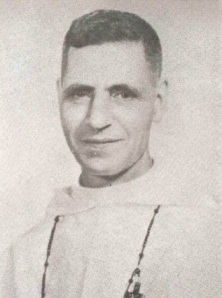About the author: Juan Labrador, O.P. ( –July 12, 1967). Secretary General of Santo Tomas University, 1930-36. Among the first two moderators of The Varsitarian. Rector of Colegio de San Juan de Letran, 1936-45. Professor and Dean of the College of Liberal Arts and then Rector Magnificus of the University of Santo Tomas, 1961-65.
About the diary: Originally written in Spanish, the diary covers the period December 7, 1941-May 7, 1945. An English translation of the diary was published as A Diary of the Japanese Occupation, Santo Tomas University Press, Manila, 1989. ISBN 971-506-019-6. In his introduction, Maximoi Marina, O.P., Secretary General of the University of Santo Tomas, reproduced the scope of the diary as explained by the author himself. Fr. Labrador wrote,
I begin writing these notes as a neutral observer, as a resident of the Philippines for the last twenty-three years, and as Rector of one of the leading colleges in Manila. I believe I can render an unbiased account of what the invaders have done or undone in these Isles of the Pacific. Through personal experiences and observation, through the prolonged contacts with persons from different walks of life and history of this country, past and present, I think I am in a position to interpret the events that are taken place before my eyes. Though not an American, I have lived years in the United States taking one year of post graduate work at the Catholic University of America, Washington, D.C., and I have learned to respect and admire American institutions and men worthy of admiration and respect. I may claim at this point, in fact, a fair knowledge of their ideas and ideals.
I do not feel constrained, however, to whitewash the defects and blunders of the United States Government and High Command in the last months of 1941. There will be criticism, but these notes shall not be fault-finding, caustic censures. The Americans, individually and collectively, made some very serious mistakes — otherwise they would not have lost their Pacific possessions in a few days. But their errors, however grave, were not due to bad faith. They proceeded, on the contrary, from an excess of goodwill or over-confidence, if you wish. Their good faith was the cause of their unpreparedness. Their failings and failures, their mistakes and misunderstandings, can all be traced back to the fact that they were caught unprepared and unarmed…
As these notes are written when the outcome of the war is obviously undecided, they have the advantage of being uninfluenced by the victorious enthusiasm of the postwar. Where they may lack in retrospective and critical analysis, they gain impartiality and vividness. The sense of historical perspective may be deficient, but the perception is more vivid, the judgement more factual, and the actuality more acute. We are living and touching the events and their consequences. Many of the impressions will have to be corrected in the light of future developments, but they reveal the psychological and, sometimes, the pathological status of those who are living under these trying conditions…
The fact that I have begun these notes — though I doubt whether I will finish them — is a proof of where my sentiments, my convictions, my hopes lie.
Readers are urged to contact UST Publishing House for copies of the publication.
The Philippine Diary Project is grateful to Aira Espino for her invaluable assistance in encoding the entries of this diary.
